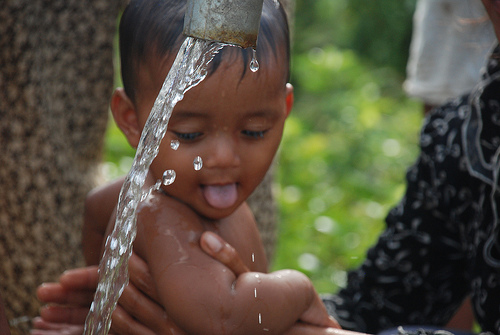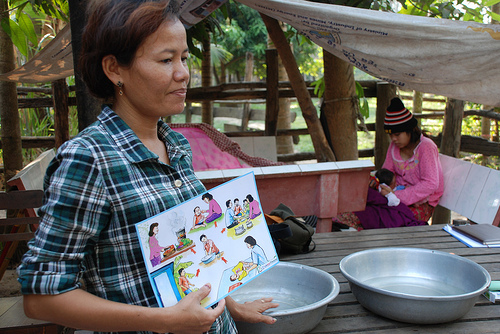On 20th Anniversary of World Water Day, Lotus Outreach Works to Increase Awareness on Linkages Between Waterborne Illness and Open Defecation, Poor Hygiene in Rural Cambodia
On May 22, 2013, the international community marks the 20th anniversary of World Water Day, established at the 1992 United Nations Conference on Environment and Development as a global day to celebrate fresh water. Lotus Outreach International is marking the occasion by working to increase awareness on a widely ignored, and taboo, barrier to freshwater access in the developing world: fecal contamination of water sources caused by poor hygiene and open defecation.
According to the World Health Organization, diarrhea alone kills 2.2 million people each year, and causes 8.5% of all deaths in Southeast Asia--with children under five being disproportionately affected. Other waterborne disease caused primarily by fecal contamination of food and water sources include typhoid and cholera, both of which have been largely eradicated from the developed world, but infect around 20 million people in the Global South each year.
"The development community is all over water access--building wells, distributing water filters and even handing out water purification drinking straws--but few organizations are willing to have a candid discussion about the real culprit in waterborne disease: human fecal contamination," shares Lotus Outreach's Executive Director Erika Keaveney. "When we allow our discomfort to censor the discussion, we do a great disservice to the communities we serve. The fact is most people in our target villages in rural Cambodia simply do not understand that germs are transmitted via human feces."
Despite significant progress in the past few decades across the spectrum of human development indicators--including life expectancy, education, and maternal health--open defecation is still widespread in Cambodia, with 72% of the rural population engaging in the practice in 2010 (compared to 89% in 1990). Further, hygienic behaviors such as hand-washing after defecation and before food preparation are rarely practiced, with Lotus Outreach community surveys placing the rate of people who wash their hands after defecation at as low as 5% in the mountainous villages of the Pursat province.
Lotus Outreach attributes these troubling statistics to lack of information on preventative health practices: "behavioral change starts with knowledge, which is actually quite easy and inexpensive to spread," shares Keaveney. "We literally bring a microscope into a village, and show moms and kids--for the first time in their lives--what a germ looks like, and explain how they are spread. We also conduct public awareness sessions on hygiene and sanitation--including the importance of hand washing after going to the bathroom and the risks associated with open defecation."
As a part of its hygiene and sanitation programs, Lotus Outreach additionally installed 24 toilets for "model families" in Pursat, with the goal of sparking a cultural shift in toilet use. Indeed, at the beginning of the project in 2009, only 31 families (about 3% of 1,059 total) had toilets. At the end of project in 2012, 200 toilets were installed in the area with 33% of the population reporting using toilets on a regular basis.
Lotus Outreach is not alone in its push to break the silence on the topic of fecal contamination. In August of last year, the Bill and Melinda Gates Foundation announced a $3M grant project to spawn innovation in toilet models that can function without water, electricity or a sewage system--necessary features in the push to expand toilet use in the developing world.
"Our goal is not to minimize the importance of water access," states Keaveney. "Indeed, we have been running critical water access projects since 2007. Our goal this World Water Day is rather to bring attention to an unsexy problem that is largely ignored by the media."

A Cambodian boy enjoying clean water. Photo copyright: Lotus Outreach
About Lotus Outreach: Lotus Outreach is a California-based 501 (c)(3) dedicated to ensuring the education, health and safety of vulnerable women and children in the developing world.

